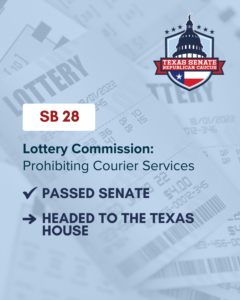| The Betrayal of the Texas Lottery Commission
In 1992, Texas established a state lottery with strict safeguards to protect the public from fraud, underage gambling, and organized crime. The Legislature laid out clear principles, expecting the TLC to uphold integrity, security, and fairness. Nowhere in the law was the agency authorized to rewrite these safeguards or create loopholes. In fact, the Legislature specifically prohibited selling tickets to minors or over the phone.
Yet, the TLC has deliberately ignored its responsibilities. Instead of enforcing the law, it has actively created loopholes that have enabled illegal gambling, underage participation, and the operation of unregulated lottery courier services.
Let me be clear: the illegal lottery operation we now have was not devised by outsiders exploiting the system—it was built from within. While external actors may have influenced rule changes, it was the TLC staff and commissioners who authorized couriers, changed rules to accommodate them, and then falsely claimed they lacked the authority to stop the illicit operation.
A History of Corruption
The decline of the Lottery Commission’s integrity began years ago. In 1995, when a New Jersey police officer attempted to claim a Texas Lottery jackpot he had purchased through an unauthorized courier, the TLC rightly rejected his claim. This was the standard of integrity the Legislature expected.
But by 2015, the TLC quietly changed course. It introduced administrative rule changes that redefined how tickets could be purchased, removing previous safeguards. Initially, these changes only applied to Mega Millions, but by 2017, they were expanded to Powerball. This was the first step in enabling lottery courier services to flourish under the false premise that they were merely “taking orders” over the phone.
Then the TLC took another step, authorizing third-party sales systems. Again, this was presented as a simple change for grocery store sales, but in reality, it further enabled couriers to operate without oversight.
In 2020, during a Zoom meeting at the height of the COVID pandemic, the Commission made its most damaging rule changes. It eliminated the requirement for in-person ticket purchases, allowed sales to occur 24/7 (even when stores were closed), and removed restrictions on phone-based purchases. These changes directly enabled the criminal enterprise we are now uncovering.
The $95 Million Jackpot Scandal
In April 2023, these corrupt rule changes culminated in a massive fraud. A group using a sophisticated algorithm and multiple courier-run “sweatshop” facilities was able to generate nearly all 26 million possible Lotto Texas combinations in just 72 hours—something that should have been logistically impossible.
With the TLC’s cooperation, four Texas Lottery-licensed retailers—Hooked on Montana (MT)(Colleyville), Lottery.com (Spicewood), Luck Zone (Round Rock), and ALTX Management (Waco)—were equipped with last minute extra terminals and communication systems to process these tickets.
As a result, one of these locations, Hooked on Montana (MT), “won” the $95 million jackpot. The transactions were suspicious, yet the TLC took no action. Instead, they enabled and legitimized the payout, despite clear indications of fraud, money laundering, and illegal activity.
|

